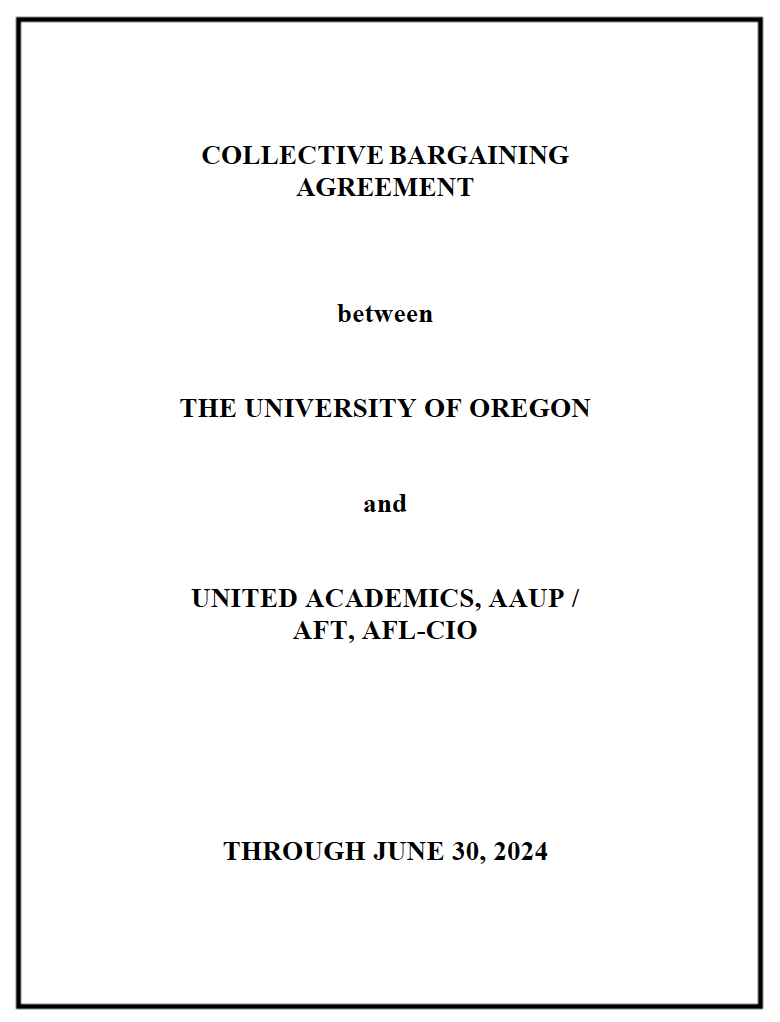Bargaining
Contact Us

Join us!
-
Aug 13, 1:30 pm to 4:30 pm – Chiles 125
-
Aug 26, 12:30 pm to 3:30 pm – Chiles 125
If you cannot join the bargaining sessions in person, you can Zoom into the sessions here. Your support and involvement help!
Additional information on bargaining progress can be found on UA’s digital newsletter, The Duck & Cover.
What We Are Bargaining For
PAY
We are pushing for across-the-board raises that account for inflation in cost of living and that put us on par with other AAU public universities. (The Association of American Universities is a group of 71 universities considered to be leaders in research). We will bargain for equity and merit raises in this round as well as increased promotion raises.
EQUITY
In addition to equity raises, we will negotiate for language that protects faculty review processes, and that recognizes service inequities. We will discuss teaching loads for faculty and demand professional development time for Career faculty. We will fight for transparency in the reclassification for Pro Tem faculty and increased protections for Funding Contingent faculty. We will also propose improvements to ADA procedures.
RESPECT
We aim to reassert the primacy of faculty in developing internal governance, workload, and review standards. We will continue to bargain for the protection of shared governance and the integrity of unit policies in review processes.
SUPPORT
We will push to expand benefits for sabbatical and other leaves. We will propose a donated sick-leave bank and a new bereavement leave. We will bargain for increased support for Researchers.
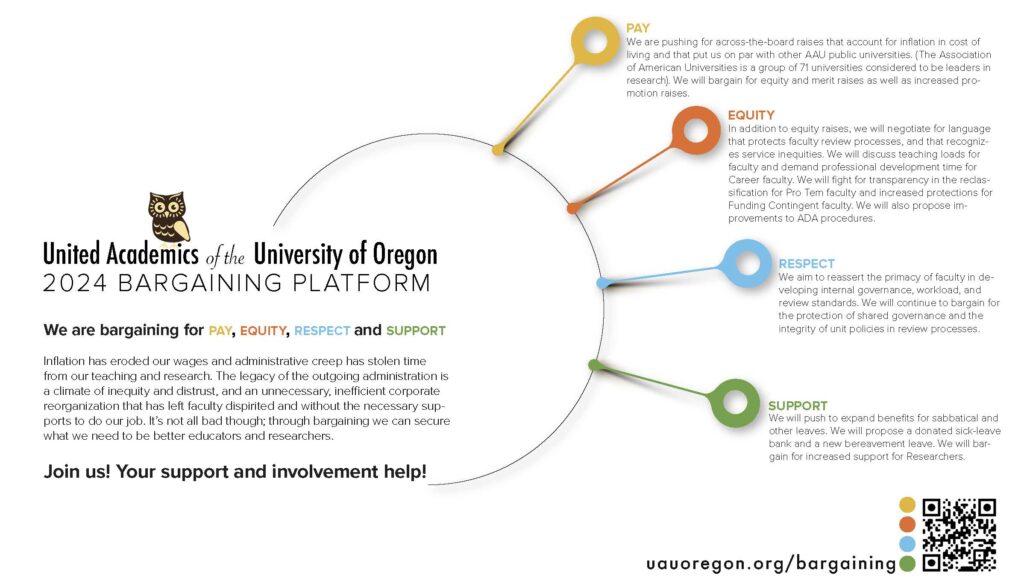
All Proposals
Ground Rules
Article 3: Shared Governance - TA'd
Article 4: Unit-level Policies
Article 6: Policies and Practices - TA'd
Article 8: Personnel Files - TA'd
Article 9: Union Rights
Article 10: Dues Deductions - TA'd
Article 11: Release Time - TA'd
Article 12: Facilities and Support
Article 13: Health and Safety - TA'd
Article 15: Academic Classification and Rank
Article 16: Notices of Appointment
Article 17: Assignment of Professional Responsibilities
Article 19: Career Faculty Review and Promotion
Article 20: Tenure Review and Promotion
Article 21: Review Decision Appeals - TA'd
Article 22: Grievance Procedure
Article 26: Salary
Article 28: Miscellaneous Benefits
Article 32: Leaves
Article 33: Sabbatical
Article 34: Caregiving
Article 36: Professional Development
Article 38: Criminal Records Checks
Article 41: No Strike, No Lockout - TA'd
Article XX: Researcher Support
Appendix 1 - Implementation Agreements
Appendix 2 - Unit Policy Development Guidelines
Appendix 4: University Distinguished Teaching Professor Program
Appendix 5: Agreement in the American English Institute
Meet Your 2024 Bargaining Team
Your bargaining team is a collection of officers and volunteers from across campus. Feel free to reach out and share your thoughts about what is, and what is not working with our CBA.

Maram Epstein
Maram Epstein has made her career at the UO. She has been here for almost 30 years and is now a Professor of Chinese in East Asian Languages in Literatures. Maram has served in a number of faculty and administrative roles, including Program/ Department Head and member of the UA Executive Board representing TTF. Their particular foci for this round of bargaining are: compensation and making sure that salaries are competitive enough to hire and retain good colleagues; ensuring that the faculty review process is fair, accurately reflects disciplinary differences, and does not serve as a barrier to faculty diversity; improving institutional support for excellence in teaching and research.

Jake Searcy
Jake Searcy is a research assistant professor in the school of computing and data sciences focused on applying ML and AI algorithms to shed light on complex problems in society and science. He received his PH.D for UO in 2012, and continued his career at the University of Michigan and Ford Motor Company. Jake returned to UO as part of the Data Science Initiative in late 2018 where he has worked closely with researchers across campus interested in incorporating and developing ML methodologies with their own work. In this role, Jake has experienced the breadth of UO research from earth science to accounting, and is excited to help support research faculty across UO on the Bargaining team.

Charlene Liu
Charlene Liu is a Professor of Art and the Printmaking Curricular Coordinator and has taught at the University since 2007. She has served as the Department Head of Art, Interim Director of the School of Art + Design and Interim Associate Dean of Student Affairs for the College of Design. She joined the bargaining team to contribute to the important process of contract bargaining, bringing her experience from her work as an administrator, educator, and printmaker-artist. In her studio, she creates prints, paintings, and installation work and also enjoys painting watercolors en plein air.

Dan Webb Howard
Lundquist College of Business Steward
Dan Webb Howard is an instructor in the Lundquist College of Business, where he teaches business law and negotiations courses. He began teaching at UO in 2019, following an 18-year legal career that spanned a wide range of practice areas, including employment law, tax litigation, and immigration law.
In addition to serving on the bargaining team, Dan is a member of UA’s Grievances & Contract Administration Committee (GCAC).
Off campus and away from work, Dan enjoys playing guitar and singing, especially bossa nova, latin jazz, and funk music. You may occasionally see him playing at live music venues in the Eugene area.

Debbie Green
Executive Vice President
Deborah Green is the Greenberg Associate Professor of Hebrew Language and Literature in the Department of Religious Studies. Her research area of focus is the interplay among everyday life in the ancient Near East, history of biblical interpretation, and the layered language of metaphor found in interpretation. She teaches lower and upper/graduate division courses. Before going to grad school (as a “returning” student), Deborah worked for two major benefit and compensation consulting firms.
Deborah’s work with United Academics predates the union itself. She has served on the finance committee since the formation of the union, and she has been involved with the family caucus for many years. She served as a Representative and later as Chair of the Representative Assembly. Deborah has served on each bargaining team since the formation of the union. This is her fourth round.
Email Debbie

Josh Razink
Research Units Representative
Josh Razink is a Senior Research Assistant I working at the Center for Advanced Materials Characterization at Oregon (CAMCOR) as the Director of the Transmission Electron Microscopy Facility for over 10 years. In United Academics, Razink currently serves on the Representative Assembly and the Finance Committee. He also served on the bargaining team during negotiations of the last CBA. Razink is particularly interested in issues surrounding funding contingent research faculty. When not assisting researchers with their experiments at the micrometer, nanometer, and Angstrom length scales, Razink enjoys traveling, cooking, fishing, and video games.

Glen Waddell
Glen Waddell is a Professor of Economics, with over twenty years of experience teaching personnel economics and contract theory—as a data scientist, applying empirical methods to the identification of causal relationships that lead to richer understandings of individuals and institutions. Outside of his day job, it’s music he’ll likely be wrapped up in.

Nathan Whalen
Chair of the Grievances & Contract Administration Committee
Nathan Whalen is a Senior Instructor II of Spanish, in the Department of Romance Languages, and has worked at the University of Oregon since 2001. He is interested in and teaches courses dealing with cultural geography, social and political change, and artistic manifestations in Latin America.
Nathan has served as a Humanities Representative and sat on the Organizing and Membership Committees and is now Chair of the Grievance and Contract Administration Committee.
When not around campus teaching, grading, and engaged in moderate syndicalist rabble-rousing, Nathan enjoys traveling and attempting to grow and process more fruits and vegetables than is frankly necessary.
Email Nathan

Heather Wolford
Organizing Director
Heather Wolford joined the United Academics team in September of 2018. Prior to that, she worked with faculty at Oregon State University while they organized their union, United Academics of OSU.
Heather attended UO as both an undergrad and graduate student, earning master’s degrees in International Studies and Public Administration, and is excited to be back in Eugene.
She’s a fan of live music, the outdoors, and spending time in Latin America.
Email Heather
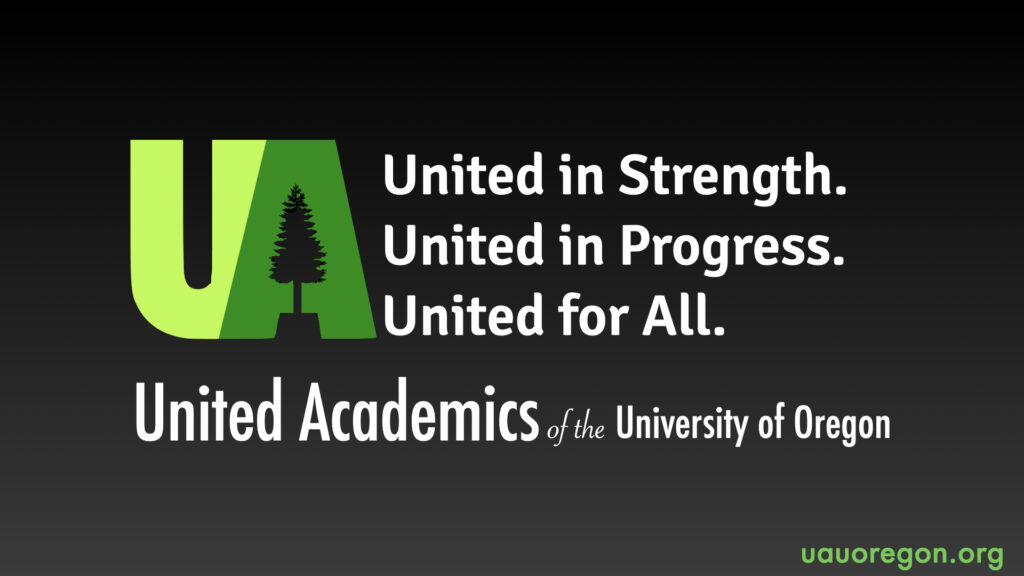


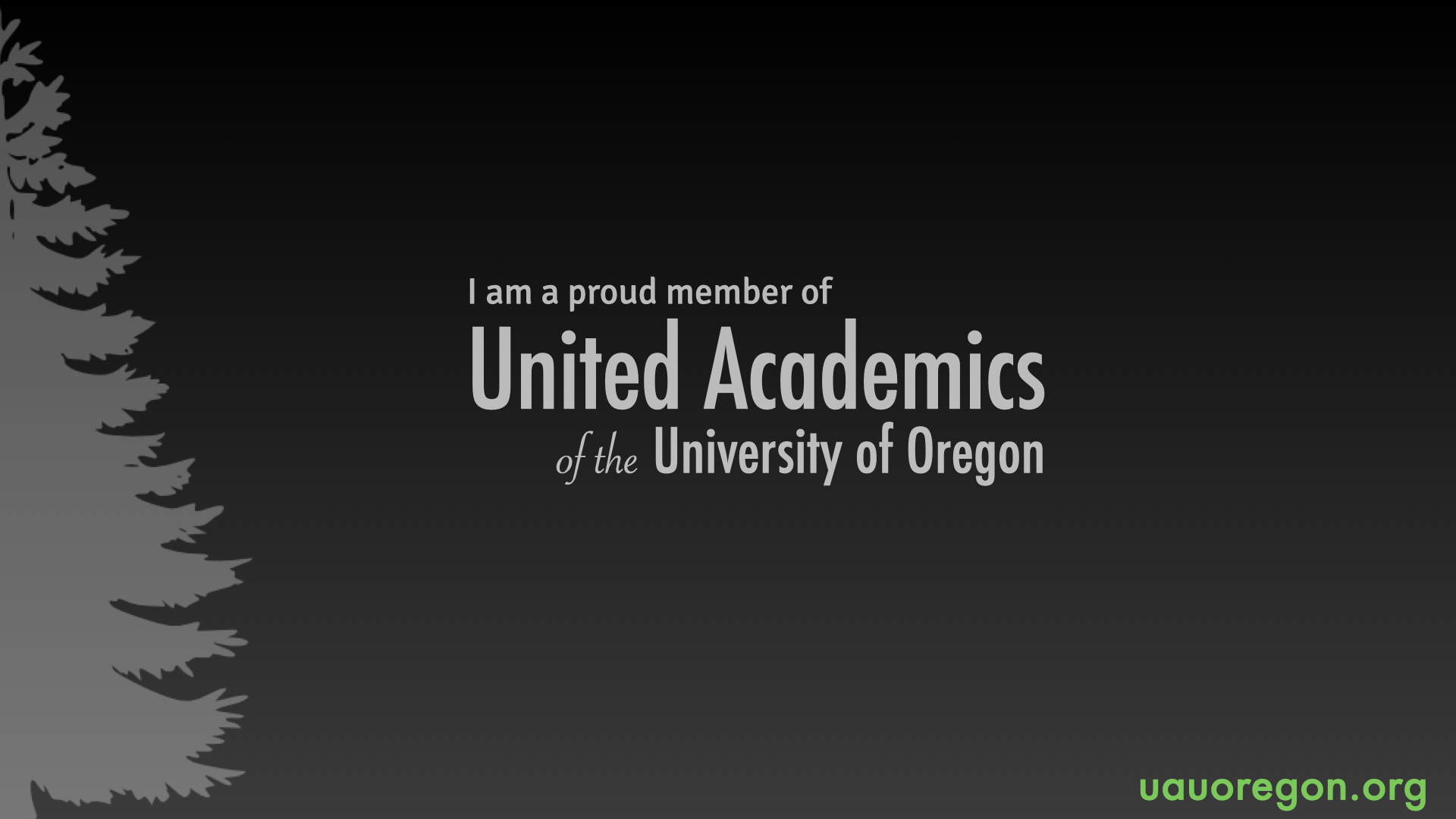
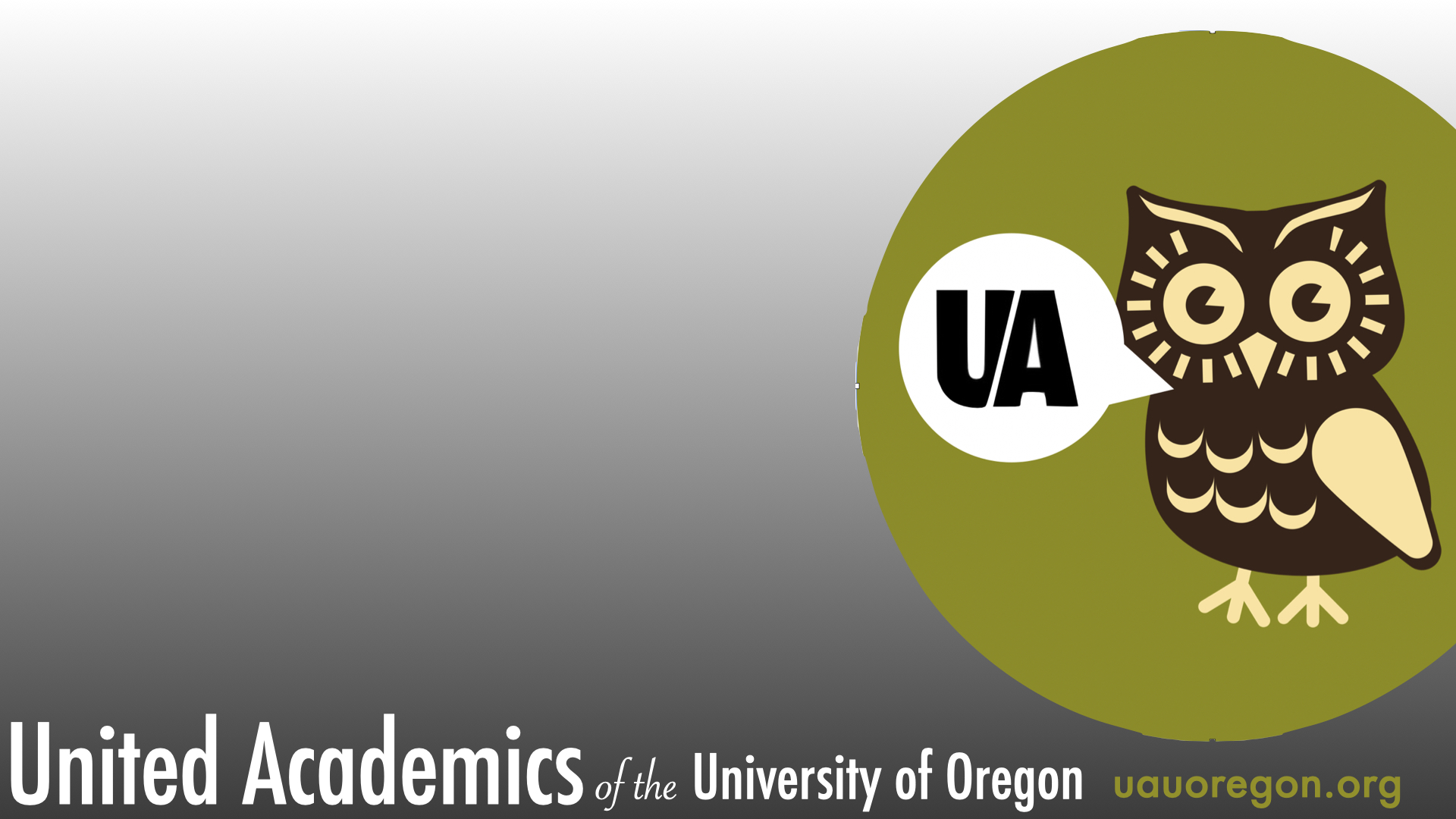
Our Current Collective Bargaining Agreement
2021-2024 CBA
The Collective Bargaining Agreement is the contract between the University of Oregon and United Academics. This version of the CBA is the most up-to-date version, incorporating several Memoranda of Understanding and copy-edited through a mutual process.
Collective Bargaining Agreement Gains
After years of negotiation with the administration, the membership of United Academics voted to ratify the newest Collective Bargaining Agreement (CBA). You can view the Collective Bargaining Agreement here. You can find a number of highlights below:
-
- Strengthened unit-level governance processes and ensured faculty-approved policies are reviewed by the Provost
- Established a $500,000 Childcare Community Partnership Investment Fund to address the local shortage of care providers
- Created annual $150,000 Travel Support Fund to offset work-related caregiving costs
- Won 10% raises over the three years of the contract and raised salary floors
- Instituted post-promotion raises for Career faculty equal to those for tenured faculty (4% for meeting and 8% for exceeding expectations)
- Ended “up or out” nature of promotion reviews for Library faculty
- Defined funding-contingent status to prevent faculty from being misclassified
- Created new Research Assistant types, allowing more nuanced definition between positions
- Established a “reporting site” for all faculty and narrowed admin’s ability to relocate or assign faculty work that requires travel
- Established reinstatement process for laid-off Career researchers and instructional faculty
- Clarified eligibility, timing, and course loads for faculty on sabbatical
- Created Teaching Professor category to highlight and reward the expertise of our Career instructors
The Collective Bargaining Agreement (CBA) ratified in July 2022 left several key issues to an appendix of implementation agreements to be worked out over the following months and beyond, including caregiving supports; proposed changes to the Tenure Reduction Program (TRP); the role of service in our work; pay equity; and our units’ policies on merit, performance and promotion reviews, and professional responsibilities. Send us an email at [email protected] to express interest in joining us in this work. Feel free to reach out to ask any clarifying questions you might have.
Revision of Unit Policies
Implementation Agreement #2 of the CBA requires that unit merit policies be revised by June 2023—in advance of distributing merit raises (out of a 3% pool) in January 2024.
Similarly, unit policies on professional responsibilities (i.e., workload and assignment of work duties), performance reviews, and promotion and tenure reviews need to be revised by June 2024.
In consultation with deans, the administration is preparing policy templates for units to ensure that new unit policies will align with the current collective bargaining agreement (CBA) language. The use of templates is fine—and helpful!—as long as everyone is clear that they are starting points rather than ends in themselves.
It may be tempting to speed through the process of revising policies, and there would be clear benefits to reducing ambiguity or uncertainty sooner rather than later. However, it’s even more important to review and revise unit policies to be thorough, transparent, and genuinely participatory.
This is where the rubber meets the road in terms of shared governance. As with local elections, we have the most power to influence the outcomes within our own units. If we want to transform the nature of our work, how our duties are assigned, or how our performance is measured and rewarded, this is our opportunity. Let us seize it.
Proposed Changes to TRP
At the close of our negotiations last June, the administration presented a new proposal to change the Tenure Reduction Program. Because we received this new proposal two days before the last planned bargaining session, our bargaining team felt strongly that we did not have enough input from our members to accept or reject the offer. We also did not have enough time to submit changes to the proposal. As a result, the administration and the union agreed to hold a separate vote on this proposal after the ratification of the Contract Bargaining Agreement (CBA).
According to the Implementation Agreement signed by UA and the administration, we are to either negotiate or simply vote on the administration’s proposal by early January 2023. If we negotiate on TRP, both parties would sign a new Memorandum of Understanding (MOU) that would outline the agreed-upon changes to TRP. This MOU would need to be signed by December 31, 2022. In the absence of such an MOU, the administration’s proposal from June 15, 2022, would be put to a ratification vote of UAUO members during January 2023.
Caregiving
The brand-new Caregiving article (Article 34) in the CBA:
-
- underscores that caregiving responsibilities should be taken into account for scheduling, clock stoppage, and leaves
- commits UO to provide access to Care.com to faculty to help identify potential caregiving solutions
- creates an annual $150,000 Travel Support Fund to offset work-related caregiving costs
Furthermore, Implementation Agreement #5 of the CBA establishes a one-time $500,000 Childcare Community Partnership Investment Fund to address the local shortage of care providers.
Service
The burdens of service assignments are not generally distributed equitably among faculty along the dimensions of race, ethnicity, gender, classification, category, or rank. Inequities in service burdens lead to professional advantages for those who avoid or neglect service obligations while creating professional obstacles for those who take on more service responsibilities or discharge them more diligently. Negative impacts may include foregone merit increases, delayed promotion, failed promotion, nonrenewal, or layoff.
Implementation Agreement #3 of the CBA calls for a joint committee to consider how to enhance the equitable distribution of service, informed by the ongoing work of the UO Senate Task Force on Service.
Pay Equity
Bargaining resulted in two parallel mechanisms for focusing on pay equity issues on campus:
-
- The Memorandum of Understanding (MOU) on salaries ratified in December 2021 affirmed that the administration and United Academics will form a joint study group to discuss how inflation and equity impact faculty salaries generally.
- Implementation Agreement #6 of the CBA calls for a “Request for Proposal” (RFP) during Fall 2022 for an external consultant to review internal pay equity for Career instructional faculty “to determine if inequities exist that cannot be explained by legitimate, nondiscriminatory reasons such as performance, years of experience, education, discipline, specialization, rank, and position expectations. The study’s parameters ultimately shall be decided by the University, with input from the Union.”
These two mechanisms are in addition to the ongoing work of UO’s Office of Investigations and Civil Rights Compliance (OICRC) and the role of Oregon’s Bureau of Labor & Industries in enforcing the Oregon Equal Pay Act (OEPA). Individual cases of pay inequity can always be explored—and hopefully resolved—through these channels. Our goal with the pay equity studies is to tackle many potential cases in parallel in the interests of efficiency.

